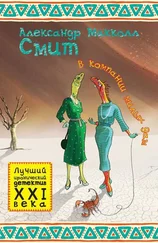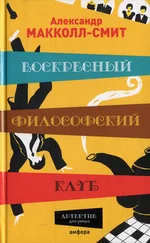‘ Tomato Soup with floating pumpkin pieces ,’ he read.
‘Yes,’ said Mma Makutsi defensively. ‘That is the soup.’ She paused, and then added, ‘Of the day.’
‘Not the soup of yesterday?’
‘Hah,’ she said. ‘No, it is not the soup of yesterday: it is tomato soup with pumpkin pieces.’
‘They float?’ asked Phuti.
‘That’s what it says, Phuti. You see, these days it is very fashionable to have things floating in food. There are things called croutons , which are really pieces of fried bread – or that’s what you and I would call them – but they are croutons and they float on the top of soup. These bits of pumpkin will be like croutons .’
It was so far from Bobonong, she thought; so far. There had been no croutons in Bobonong.
‘But does pumpkin float, Grace? I always thought that pumpkin was quite heavy. I do not think that it would float in tomato soup.’ He waited for a reaction, but she remained silent. ‘So perhaps this will be tomato soup with sunken pumpkin pieces.’ He paused again. ‘Perhaps it could be called Tomato Soup Surprise – the surprise would come when you found pieces of pumpkin at the bottom of your soup.’
Mma Makutsi was tight-lipped. ‘I do not think so,’ she muttered. ‘I think that this pumpkin will float. The chef must have tried it out before.’
Phuti shrugged. ‘Perhaps. Perhaps.’ He pointed to the item below the soup. ‘ The Handsome Man’s Hungry Sandwich ,’ he read. ‘This says that it is a sandwich with beef, eggs, sausage, lettuce and… and chips.’ He was puzzled by the chips. ‘Chips, Grace? Chips?’
‘They are very popular,’ said Mma Makutsi. ‘Look at Charlie and Fanwell – what do they eat if they get half the chance? Chips.’
‘They are boys,’ said Phuti. ‘They are young. They are not the sort of person you want to attract to the Handsome Man’s De Luxe Café. They are suitable for ordinary, second- or third-class cafés.’
‘Everybody likes chips,’ said Mma Makutsi. ‘I have heard that the British High Commissioner serves chips if you have dinner at that place.’
‘I do not think so,’ said Phuti. ‘They will serve things that British people like to eat. And the same goes for the Americans.’
‘They are always eating hamburgers,’ said Mma Makutsi.
Phuti did not disagree. ‘Yes, they like hamburgers. But the point I was trying to make, Mma, is that chips do not go with sandwiches. You cannot put chips in a sandwich. People do not do that, Mma.’
‘But chips go with eggs and also with sausages? They go with those things, don’t they?’
Phuti nodded.
‘And there are eggs and sausage in the sandwich, aren’t there? So the chips go with those.’ She looked at him defiantly. ‘That is why they are there.’
He handed the menu back to her. ‘It is going to be a very interesting restaurant, Grace,’ he said.
Mma Makutsi smiled at her husband. He was so generous, so encouraging. ‘Yes,’ she said. ‘I have a very good feeling about it now.’
Phuti hesitated. Then he closed his eyes and said, ‘So… s… s… so do I, Grace.’
His stammer rarely manifested itself now, but when it did come back, it was because he felt doubt or foreboding. It was as powerful an omen as any of those signs that traditional people – people who lived all their lives in the bush, far from a town – could read in the way the wind moved in the trees, or the way a beetle scurried across a path, or a flock of birds rose up from a sheltering tree. Phuti knew that you should not ignore these signs, because as often as not they warned you of what was going to happen.
She told him that the chef would be cooking them dinner before the restaurant opened officially. ‘It’s to show us what he can do,’ she said. ‘He will do that tonight and I shall invite Mma Ramotswe and Mr J. L. B. Matekoni to join us.’
‘That is very good,’ said Phuti. ‘I am looking forward to it already.’ But he was not – he was merely being supportive, as any good husband should be when his wife insists on embarking on something that he feels is not a good idea and he knows that it is far too late to express reservations. That is the point at which wholehearted support is required, and he would give it.
Mma Ramotswe was pleased with the invitation that Mma Makutsi issued that day.
‘I cannot remember when Mr J. L. B. Matekoni and I went out to dinner,’ she said. ‘Now, let me think…’
Mma Makutsi waited. ‘It will be very good, Mma.’
‘Yes, I’m sure it will. This new chef of yours…’
‘Thomas. He is a very well-known chef. He has cooked in all the big hotels. Their standards are very high. We can expect some very good food.’
Mma Ramotswe nodded. She was still trying to remember when she and Mr J. L. B. Matekoni had last been out to dinner and was having difficulty in bringing the occasion to mind. But it was time for morning tea in the office, and Mr J. L. B. Matekoni and Fanwell would be coming through shortly from the garage next door. She could ask him; perhaps he would remember.
‘This chef of yours,’ asked Mma Ramotswe. ‘What did you say his name was?’
‘He is called Thomas.’
‘Thomas who?’
Mma Makutsi looked out of the window. ‘He doesn’t use his other name, Mma. That is sometimes the way with… with chefs.’
Mma Ramotswe said she found that very odd. ‘Is he ashamed of his name?’
Mma Makutsi shook her head. ‘I don’t think so. He is a very pleasant, cheerful man. He does not look like somebody who is ashamed of his name.’
‘What about his omang ?’ asked Mma Ramotswe. The omang was the identity card that every citizen of Botswana had.
‘I haven’t seen it,’ said Mma Makutsi.
Mma Ramotswe drew in her breath. It was a fundamental precaution to be taken before giving anybody a job. A person who did not have an omang was likely to be working illegally – and that had consequences; surely Mma Makutsi knew that.
‘If you haven’t looked at his omang , Mma Makutsi, then I’m afraid…’ She trailed off.
‘He’s not illegal,’ said Mma Makutsi quickly. ‘You can tell when somebody’s illegal. Thomas is obviously a Motswana.’
‘From the way he talks? That doesn’t tell you much, Mma. Foreigners can speak Setswana very well. And English. You cannot tell just by listening to him.’
Mma Makutsi obviously did not want to discuss the matter further. ‘Oh, well,’ she said. ‘I’m sure he’s fine.’ She had switched on the electric kettle and it was beginning to make its familiar whistling sound, which signified that the water was reaching boiling point. As she got up to fill the two office teapots – one for ordinary tea and one for redbush – the door was pushed open and Fanwell appeared, closely followed by Mr J. L. B. Matekoni. Both were wiping their hands on the rough blue paper that had replaced their traditional lint.
‘This paper is no good for oil,’ said Mr J. L. B. Matekoni. ‘It does not absorb enough. We shall have to find some more of that lint, you know. That is what mechanics have always used. Now those people are trying to change everything.’
It was never made clear who those people were. They were referred to from time to time by Mr J. L. B. Matekoni when he had occasion to complain about the vagaries of bureaucrats, or the car-makers who produced complicated electronics for their cars, or for any of those people who made life difficult for a small business.
‘It is the modern way,’ said Mma Makutsi over her shoulder. ‘We have to move forwards, Rra. It is all for the sake of progress, Rra.’
Читать дальше







![Александр Макколл Смит - Отдел деликатных расследований [litres]](/books/397661/aleksandr-makkoll-smit-otdel-delikatnyh-rassledova-thumb.webp)




